Unit 7 Food festival Topic 2 Section C课件(共27张PPT,含内嵌视频)仁爱版八年级下册
文档属性
| 名称 | Unit 7 Food festival Topic 2 Section C课件(共27张PPT,含内嵌视频)仁爱版八年级下册 | 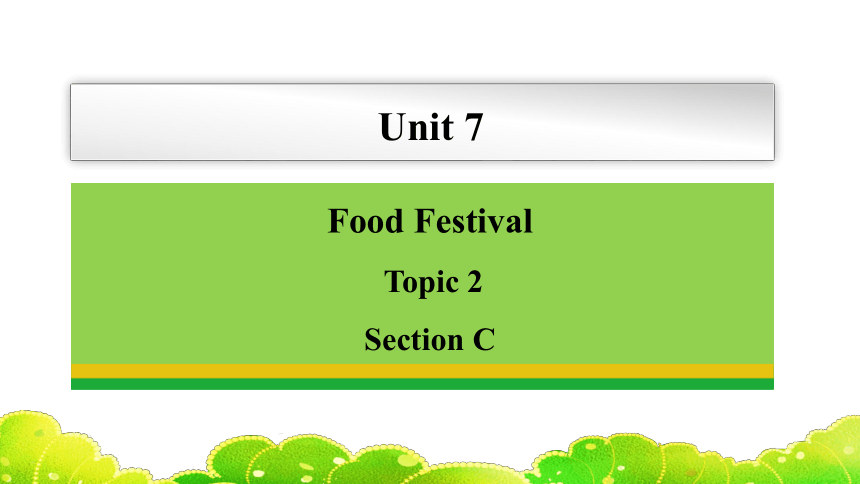 | |
| 格式 | pptx | ||
| 文件大小 | 10.6MB | ||
| 资源类型 | 教案 | ||
| 版本资源 | 仁爱科普版 | ||
| 科目 | 英语 | ||
| 更新时间 | 2024-03-24 21:13:01 | ||
图片预览

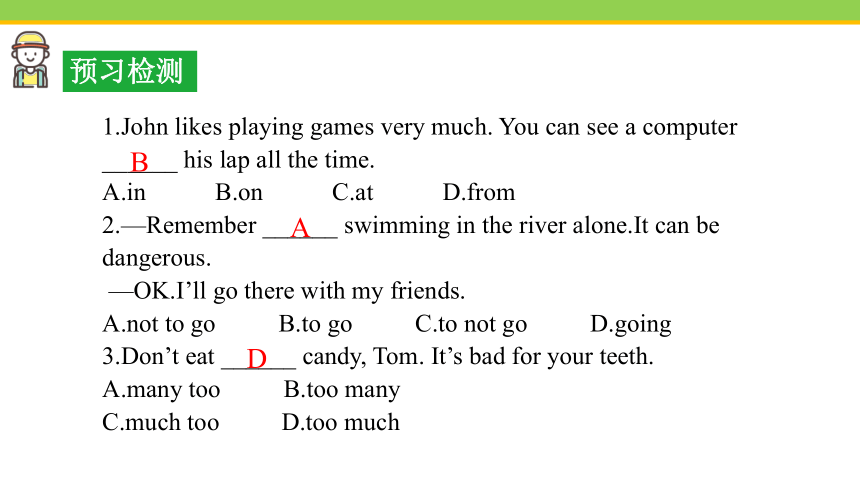
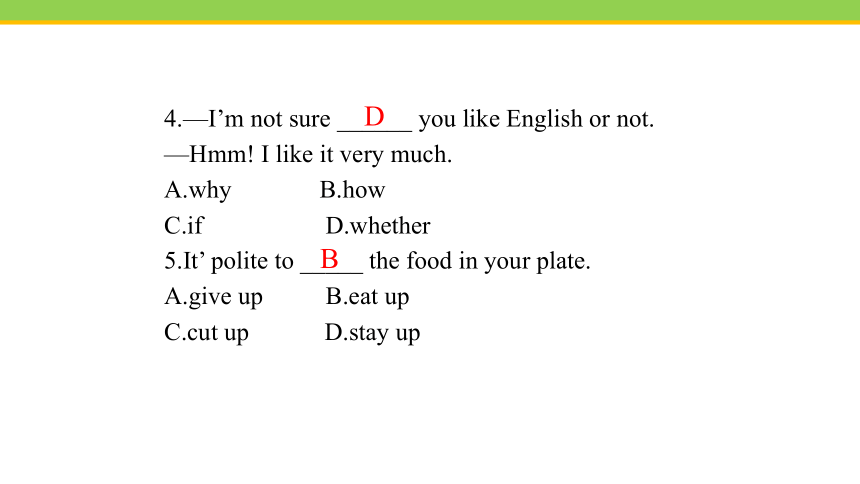
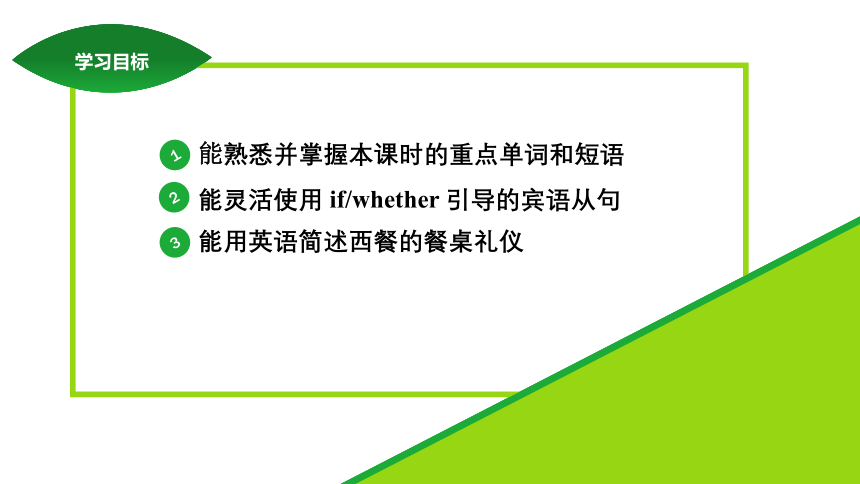
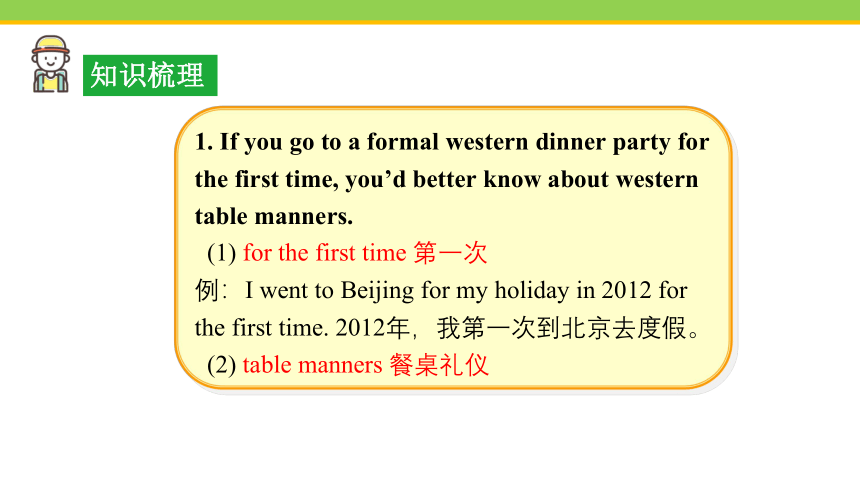
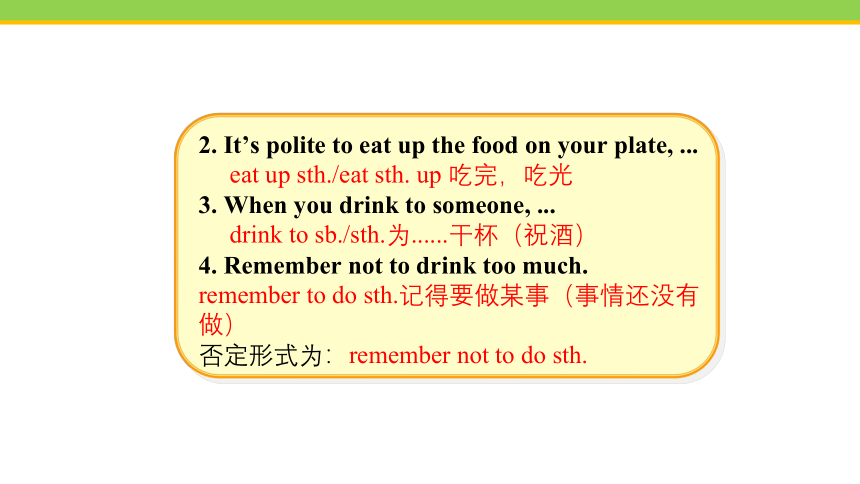
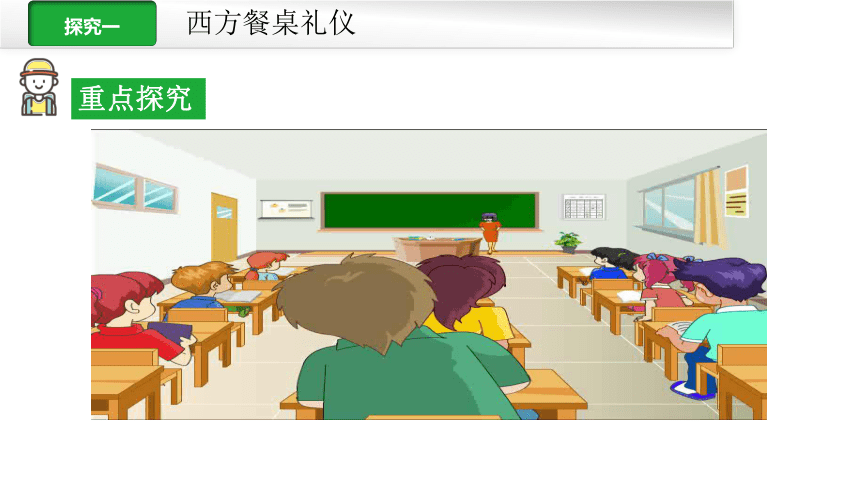
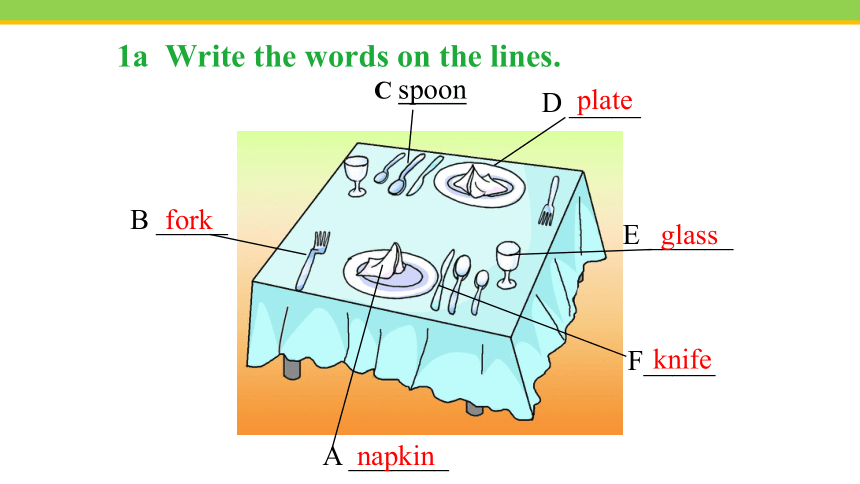
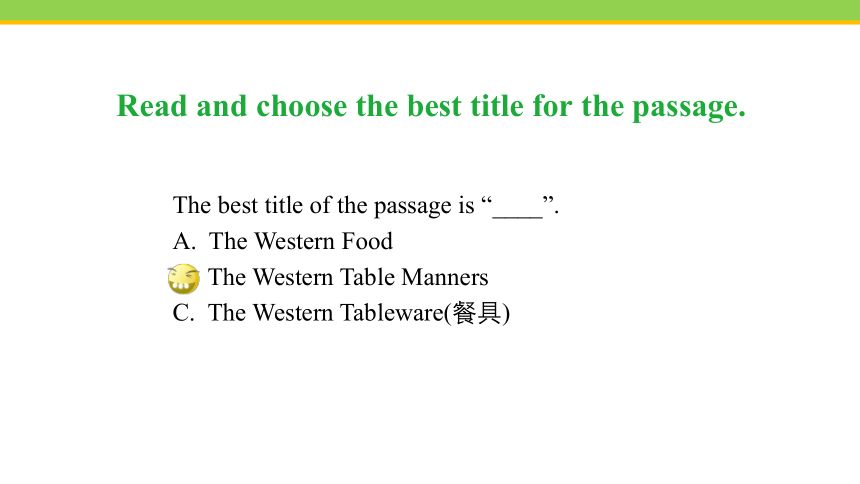
文档简介
(共27张PPT)
Unit 7
Food Festival
Topic 2
Section C
1.John likes playing games very much. You can see a computer ______ his lap all the time.
A.in B.on C.at D.from
2.—Remember ______ swimming in the river alone.It can be dangerous.
—OK.I’ll go there with my friends.
A.not to go B.to go C.to not go D.going
3.Don’t eat ______ candy, Tom. It’s bad for your teeth.
A.many too B.too many
C.much too D.too much
B
A
D
预习检测
4.—I’m not sure ______ you like English or not.
—Hmm! I like it very much.
A.why B.how
C.if D.whether
5.It’ polite to _____ the food in your plate.
A.give up B.eat up
C.cut up D.stay up
D
B
能熟悉并掌握本课时的重点单词和短语
1
2
3
能灵活使用 if/whether 引导的宾语从句
能用英语简述西餐的餐桌礼仪
知识梳理
1. If you go to a formal western dinner party for the first time, you’d better know about western table manners.
(1) for the first time 第一次
例:I went to Beijing for my holiday in 2012 for the first time. 2012年,我第一次到北京去度假。
(2) table manners 餐桌礼仪
2. It’s polite to eat up the food on your plate, ...
eat up sth./eat sth. up 吃完,吃光
3. When you drink to someone, ...
drink to sb./sth.为......干杯(祝酒)
4. Remember not to drink too much.
remember to do sth.记得要做某事(事情还没有做)
否定形式为:remember not to do sth.
西方餐桌礼仪
重点探究
A _______
B _____
C spoon
D _____
E ______
F_____
napkin
fork
plate
glass
knife
1a Write the words on the lines.
Read and choose the best title for the passage.
The best title of the passage is “____”.
A. The Western Food
B. The Western Table Manners
C. The Western Tableware(餐具)
1a Read and understand.
Look at the picture and write the words on the lines.
If you go to a formal western dinner party for the first time, you'd better know about western table manners. It's polite to
follow them.
When you sit down at the table, take your napkin and put it on your lap. When you start dining, you should keep the fork
in your right hand. If you use your knife, then put the fork in
your left hand. The dinner always starts with a small dish.
It's polite to eat up the food on your plate, so don't take more food
than you need. Maybe you don't know whether it's polite or not
to speak loudly at the table. The answer is that you should speak quietly and smile a lot. When you drink to someone, you’d better raise your cup or glass and take only a little. Remember not to drink too much. If you can’t remember these rules, just do as other people do.
Show Time
Suppose Tom would go to a formal western dinner party for the first time, but he doesn’t know their table manners. Do you want to give him some advice
1.When you start dining, you should take your napkin
first and put it on your lap.( )
2.At the table, people always keep the fork in their
left hands.( )
3.It’s impolite to eat up the food on your plate.( )
4.It’s polite to speak loudly and smile a lot.( )
5.When you drink to someone, you should raise your
glass and take only a little. ( )
T
F
F
F
T
1b Read 1a and mark T (True) or F(False).
1c Read 1a again and underline the key points about western table manners.
When you sit down at the table, ...
The dinner always starts with …
You should keep the fork ...
If you use your knife, ...
Don’t take …
Don’t speak …
When you drink to someone, you 'd better...
You may use these sentences:
I think (that) it is polite to … in China.
I think (that) it is impolite to … in China.
Then work in groups and compare them with Chinese table manners.
Knowing about the differences in table manners in different cultures is very helpful for you to succeed in cross-cultural communication.
Group Work
Table Manners in China
It’s not polite to pick up your bowl to eat.
Yor should use chopsticks to eat.
It’s not polite to stick your chopsticks into your food.
It’s impolite to point at anyone with your chopsticks.
It’s impolite to knock your empty bowl with your chopsticks.
It’s polite to ask older people to start eating first at the table.
…
通过以
活动小结
通过以上活动,我们可以知道,在西方的餐桌礼仪中,右手用1._______(knife/fork) ,左手用
2. ______ (knife/fork)。在西方吃完盘子中的食物是3._______ (polite/impolite)。
knife
fork
polite
巩固if/whether引导的宾语从句
—Can you tell me if it’s polite to eat with your arms or elbows on the table in America
— Yes, I can. It’s impolite.
— Do you know whether or not it’s impolite to smoke during a meal in France
— Yes, I do. It’s impolite.
2 Match the pictures with the conversations.
Then practice in pairs.
A
B
C
D
— We know people use a spoon and a fork to eat in Thailand. Do you know whether they use knives
— Yes, I do. They don’t use them.
— I know Indians eat with their right hands. I don’t know if there’s no need for knives, forks or chopsticks.
— No, there’s no need.
C
D
B
A
Group Work
找出2中if/whether引导的宾语从句,你发现了什么规律?小组讨论得出结论并展示。
例如:
Do you know whether or not it's impolite to smoke during a meal in France
Do you know whether they use knives
I don't know if there's no need for knives, forks or chopsticks.
在if/whether引导的宾语从句中,如果从句中有or not,连词只能用________,而不能用if。
whether
跟 whether 连用的 or not的位置之谜
在宾语从句中whether…or not表是否之意,or not的位置比较随意。
I don’t know whether it is polite to speak loudly on the table or not.
I don’t know whether or not it is polite to speak loudly at the table.
I don’t know whether it is polite or not to speak loudly at the table.
(可紧跟whether)
(可放在句尾)
(可跟在形容词之后)
3 Discuss eating customs in different countries, using object clauses.
Example:
Is it polite to point at people with chopsticks in China
A: I want to know whether/if it is polite to point at people with chopsticks in China.
B: I don't think that it is polite to point at people with chopsticks in China.
point at sb. 指向某人
I want to know whether/ if (+陈述句)
I (don’t) think that (+陈述句)
1. Is it polite to eat soup very quietly in most African countries
2. Can people smoke during a meal in France
3. Will people leave as soon as they finish eating in western countries
4. Do Americans eat food like chicken legs with their fingers
5. Does a formal western dinner always start with a small dish
n. 手指
quiet + ly— quietly adv. 安静地,寂静地
finish doing sth. 完成某事
4 Write a short passage about table manners in China.
Hello , everyone!Do you know table manners in China Let me tell you in details...
1. You’re not supposed to start eating first if there are older
people at the table.
2. You shouldn’t point at anyone with your chopsticks.
3. It’s impolite to stick your chopsticks into your food.
4. It’s impolite to use your chopsticks to hit an empty bowl.
5. You are not supposed to talk when you’re having dinner.
6. It’s not necessary to order too many dishes.
7. It’s impolite to make a big noise when you are eating soup.
8. You’re not supposed to put your clothes into a bowl or
plate when picking up your food with chopsticks.
通过以
活动小结
通过以上活动,我们可以知道,在if/ whether 引导的宾语从句中,如果从句中有or not,连词只能用________,而不能用if。在宾语从句中,主句是一般现在时,其宾语从句可以根据需要使用时态;条件状语从句中,从句用____________态代替将来时。
whether
一般现在时
当堂检测
1. your; the; in; left; fork; hand; put
_________________________________________.
2. up; it's; food; to; plate; eat; the; on; your; polite
_________________________________________ .
3. I; know; during; smoke; whether; France; people; to; a; meal; can; want; in.
_________________________________________
_________________________________________.
4. is;polite; it; in;point; with; at; to; chopsticks; China; people
_____________________________________________
5. they; do; know; knives; you; use; whether
_________________________________________
一、连词成句,句尾符号已给出。
Put the fork in your left hand
It's polite to eat up the food on your plate
I want to know whether/if people can smoke during a meal in France
Is it polite to point at people with chopsticks in China
Do you know whether they use knives
课堂总结
Unit 7 Topic 2
Section C
重点单词:
formal, manner, napkin, lap, fork, dish, quietly, dine, elbow, spoon, chopstick, finger
谈论西方的餐桌礼仪:
在西方的餐桌礼仪中,右手用1._______(knife/fork) ,左手用
2. ______(knife/fork)。在西方吃完盘子中的食物是3._______ (polite/impolite)。
重点短语:
for the first time, eat up sth., table manners, drink to sb.remember to do sth., point at, finish doing sth.
knife
fork
polite
Unit 7
Food Festival
Topic 2
Section C
1.John likes playing games very much. You can see a computer ______ his lap all the time.
A.in B.on C.at D.from
2.—Remember ______ swimming in the river alone.It can be dangerous.
—OK.I’ll go there with my friends.
A.not to go B.to go C.to not go D.going
3.Don’t eat ______ candy, Tom. It’s bad for your teeth.
A.many too B.too many
C.much too D.too much
B
A
D
预习检测
4.—I’m not sure ______ you like English or not.
—Hmm! I like it very much.
A.why B.how
C.if D.whether
5.It’ polite to _____ the food in your plate.
A.give up B.eat up
C.cut up D.stay up
D
B
能熟悉并掌握本课时的重点单词和短语
1
2
3
能灵活使用 if/whether 引导的宾语从句
能用英语简述西餐的餐桌礼仪
知识梳理
1. If you go to a formal western dinner party for the first time, you’d better know about western table manners.
(1) for the first time 第一次
例:I went to Beijing for my holiday in 2012 for the first time. 2012年,我第一次到北京去度假。
(2) table manners 餐桌礼仪
2. It’s polite to eat up the food on your plate, ...
eat up sth./eat sth. up 吃完,吃光
3. When you drink to someone, ...
drink to sb./sth.为......干杯(祝酒)
4. Remember not to drink too much.
remember to do sth.记得要做某事(事情还没有做)
否定形式为:remember not to do sth.
西方餐桌礼仪
重点探究
A _______
B _____
C spoon
D _____
E ______
F_____
napkin
fork
plate
glass
knife
1a Write the words on the lines.
Read and choose the best title for the passage.
The best title of the passage is “____”.
A. The Western Food
B. The Western Table Manners
C. The Western Tableware(餐具)
1a Read and understand.
Look at the picture and write the words on the lines.
If you go to a formal western dinner party for the first time, you'd better know about western table manners. It's polite to
follow them.
When you sit down at the table, take your napkin and put it on your lap. When you start dining, you should keep the fork
in your right hand. If you use your knife, then put the fork in
your left hand. The dinner always starts with a small dish.
It's polite to eat up the food on your plate, so don't take more food
than you need. Maybe you don't know whether it's polite or not
to speak loudly at the table. The answer is that you should speak quietly and smile a lot. When you drink to someone, you’d better raise your cup or glass and take only a little. Remember not to drink too much. If you can’t remember these rules, just do as other people do.
Show Time
Suppose Tom would go to a formal western dinner party for the first time, but he doesn’t know their table manners. Do you want to give him some advice
1.When you start dining, you should take your napkin
first and put it on your lap.( )
2.At the table, people always keep the fork in their
left hands.( )
3.It’s impolite to eat up the food on your plate.( )
4.It’s polite to speak loudly and smile a lot.( )
5.When you drink to someone, you should raise your
glass and take only a little. ( )
T
F
F
F
T
1b Read 1a and mark T (True) or F(False).
1c Read 1a again and underline the key points about western table manners.
When you sit down at the table, ...
The dinner always starts with …
You should keep the fork ...
If you use your knife, ...
Don’t take …
Don’t speak …
When you drink to someone, you 'd better...
You may use these sentences:
I think (that) it is polite to … in China.
I think (that) it is impolite to … in China.
Then work in groups and compare them with Chinese table manners.
Knowing about the differences in table manners in different cultures is very helpful for you to succeed in cross-cultural communication.
Group Work
Table Manners in China
It’s not polite to pick up your bowl to eat.
Yor should use chopsticks to eat.
It’s not polite to stick your chopsticks into your food.
It’s impolite to point at anyone with your chopsticks.
It’s impolite to knock your empty bowl with your chopsticks.
It’s polite to ask older people to start eating first at the table.
…
通过以
活动小结
通过以上活动,我们可以知道,在西方的餐桌礼仪中,右手用1._______(knife/fork) ,左手用
2. ______ (knife/fork)。在西方吃完盘子中的食物是3._______ (polite/impolite)。
knife
fork
polite
巩固if/whether引导的宾语从句
—Can you tell me if it’s polite to eat with your arms or elbows on the table in America
— Yes, I can. It’s impolite.
— Do you know whether or not it’s impolite to smoke during a meal in France
— Yes, I do. It’s impolite.
2 Match the pictures with the conversations.
Then practice in pairs.
A
B
C
D
— We know people use a spoon and a fork to eat in Thailand. Do you know whether they use knives
— Yes, I do. They don’t use them.
— I know Indians eat with their right hands. I don’t know if there’s no need for knives, forks or chopsticks.
— No, there’s no need.
C
D
B
A
Group Work
找出2中if/whether引导的宾语从句,你发现了什么规律?小组讨论得出结论并展示。
例如:
Do you know whether or not it's impolite to smoke during a meal in France
Do you know whether they use knives
I don't know if there's no need for knives, forks or chopsticks.
在if/whether引导的宾语从句中,如果从句中有or not,连词只能用________,而不能用if。
whether
跟 whether 连用的 or not的位置之谜
在宾语从句中whether…or not表是否之意,or not的位置比较随意。
I don’t know whether it is polite to speak loudly on the table or not.
I don’t know whether or not it is polite to speak loudly at the table.
I don’t know whether it is polite or not to speak loudly at the table.
(可紧跟whether)
(可放在句尾)
(可跟在形容词之后)
3 Discuss eating customs in different countries, using object clauses.
Example:
Is it polite to point at people with chopsticks in China
A: I want to know whether/if it is polite to point at people with chopsticks in China.
B: I don't think that it is polite to point at people with chopsticks in China.
point at sb. 指向某人
I want to know whether/ if (+陈述句)
I (don’t) think that (+陈述句)
1. Is it polite to eat soup very quietly in most African countries
2. Can people smoke during a meal in France
3. Will people leave as soon as they finish eating in western countries
4. Do Americans eat food like chicken legs with their fingers
5. Does a formal western dinner always start with a small dish
n. 手指
quiet + ly— quietly adv. 安静地,寂静地
finish doing sth. 完成某事
4 Write a short passage about table manners in China.
Hello , everyone!Do you know table manners in China Let me tell you in details...
1. You’re not supposed to start eating first if there are older
people at the table.
2. You shouldn’t point at anyone with your chopsticks.
3. It’s impolite to stick your chopsticks into your food.
4. It’s impolite to use your chopsticks to hit an empty bowl.
5. You are not supposed to talk when you’re having dinner.
6. It’s not necessary to order too many dishes.
7. It’s impolite to make a big noise when you are eating soup.
8. You’re not supposed to put your clothes into a bowl or
plate when picking up your food with chopsticks.
通过以
活动小结
通过以上活动,我们可以知道,在if/ whether 引导的宾语从句中,如果从句中有or not,连词只能用________,而不能用if。在宾语从句中,主句是一般现在时,其宾语从句可以根据需要使用时态;条件状语从句中,从句用____________态代替将来时。
whether
一般现在时
当堂检测
1. your; the; in; left; fork; hand; put
_________________________________________.
2. up; it's; food; to; plate; eat; the; on; your; polite
_________________________________________ .
3. I; know; during; smoke; whether; France; people; to; a; meal; can; want; in.
_________________________________________
_________________________________________.
4. is;polite; it; in;point; with; at; to; chopsticks; China; people
_____________________________________________
5. they; do; know; knives; you; use; whether
_________________________________________
一、连词成句,句尾符号已给出。
Put the fork in your left hand
It's polite to eat up the food on your plate
I want to know whether/if people can smoke during a meal in France
Is it polite to point at people with chopsticks in China
Do you know whether they use knives
课堂总结
Unit 7 Topic 2
Section C
重点单词:
formal, manner, napkin, lap, fork, dish, quietly, dine, elbow, spoon, chopstick, finger
谈论西方的餐桌礼仪:
在西方的餐桌礼仪中,右手用1._______(knife/fork) ,左手用
2. ______(knife/fork)。在西方吃完盘子中的食物是3._______ (polite/impolite)。
重点短语:
for the first time, eat up sth., table manners, drink to sb.remember to do sth., point at, finish doing sth.
knife
fork
polite
同课章节目录
- Unit 5 Feeling excited
- Topic 1 You look excited
- Topic 2 I’m feeling better now.
- Topic 3 Many things can affect our feelings.
- Unit 6 Enjoying Cycling
- Topic 1 We're going on a three-day visit to Mount
- Topic 2 How about exploring Tian’anmen Square?
- Topic 3 Bicycle riding is good exercise.
- Unit 7 Food festival
- Topic 1 We’re preparing for a food festival.
- Topic 2 I’m not sure whether I can cook it well.
- Topic 3 I Cooked the Most Successfully
- Unit 8 Our Clothes
- Topic 1 We will have a class fashion show.
- Topic 2 We can design our own uniforms.
- Topic 3 He said the fashion show was wonderful.
